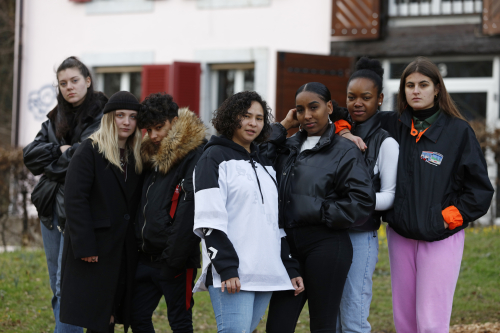
BFI Distribution
MOVIE REVIEW
La Mif (2022)
Teenagers are the worst: sensation seeking, narcissistic, moody, impulsive, melodramatic, incapable of thinking long-term at the best of times. Foster care is not the best of times. So how do you live well and happily after the catastrophe that landed you in care? Kids in foster care are not in prison, and are supposed to be able to grow up as normally as possible. Is it possible both to keep them safe and prevent them from paying for adults’ mistakes? These are the central questions of “La Mif (The Fam),” set in a group foster home in Switzerland, but this movie is too smart to offer easy answers. Instead this is an examination of what it means to live with damage and whether that’s possible without causing damage yourself.
The movie takes place over a hectic week or so, interweaving the stories of the home’s residents in the days after head caseworker Lora (Claudia Grob) returns from bereavement leave. The key girls, all around 17, are Audrey (Anaïs Uldry), who’s been seeking any kind of love since her parents died in a car crash; Alison (Amélie Tonsi), a many-pierced lesbian who’s suffered terrible sexual abuse; Novinha (Kassia Da Costa), a rowdy spitfire whose mother couldn’t care less about her; and the watchful Justine (Charlie Areddy), who is unique for being in care because of something she did, instead of something that happened to her. The night of Lora’s return, Audrey commits statutory rape to a consenting male resident and is arrested, which hugely upsets the entire home. The boys are swiftly moved elsewhere and thanks to the freed-up beds, new emergency cases are brought in, including Précieuse (Joyce Esther Ndayisenga), a quiet 13-year-old who is stunned at where she’s found herself. The caseworkers – there are eight in total, including several men – are unhappy with Audrey but unwilling to automatically criminalize her for the kind of awful acting-out most families quietly deal with themselves. The home’s managing board doesn’t agree and blame Lora to her face.
But this is a group home. Simultaneously Novinha has a trial work placement in a restaurant kitchen and Justine has family therapy she doesn’t want. Alison and her girlfriend/fellow-resident Caroline (Amandine Golay) cut school, rob an old man of his groceries and spend the day drinking his wine until the police bring them back. Another resident, Tamra (Sara Tulu), turns 18, which is no cause for celebration, because as an asylum seeker now aged out of the system, she is facing either deportation or a life on the run. Laundry must be done, meals must be prepped, cooked and eaten, swimming lessons must be attended and the social workers must keep all the girls safe while they tell lies, curse nonstop, snuggle in front of the television, wave knives around and whine about being asked to do chores. The mood ricochets like one of the balls in their table football game; sometimes it’s incredibly funny, at other times it’s desperately sad. Ms. Da Costa’s lightning reactions and Ms. Tonsi’s calm righteousness dominate, but the girls are all sensational – sparky and sensitive, with little self-pity and the capacity for incredible emotional intelligence and kindness (when they want to, of course).
This is all the more impressive since the actors all are nonprofessionals; the adults are almost all current or former social workers, and the kids are almost all current or former foster kids. Director Fred Baillif began adulthood much as Destin Daniel Cretton did, working in a group home (where Ms. Grob was his boss), but this is no “Short Term 12,” where everyone means well and only acts out in minor ways. It’s also not the misery porn from “Precious,” and no one teaches anybody lessons a la “The Blind Side.” Instead the heightened reality is reminiscent of “The Class,” the barnstorming French movie filmed in a real Parisian school, or “Putty Hill,” the underappreciated American movie based in a working-class Baltimore neighborhood; in both those films the kids, their families and the professionals around them also played heightened versions of themselves. The danger of this blurred-lines technique is that it's almost always used in deprived settings to depict hot-potato issues (racism and addiction, in these examples, and the failures of the foster care system here). The greatest strength and the greatest weakness of this method is how easy it is to forget the actors are acting, especially as they are willing to behave more riskily onscreen than almost any professional would agree to.
But here it turns out very well indeed. “La Mif’s” finale belongs to Lora, when a serious mistake involving Précieuse’s mother turns into a jaw-dropping reckoning, an act of personal honesty involving so much courage (from character and actress both) as to be nearly unbelievable. But the movie’s point is that honesty about our mistakes is the only thing that will save us, especially as the final emergency admission makes plain how other people pay the price for them. It’s a nonstop battle no matter how old you are, and it’s a pleasure to watch a movie that so profoundly understands the importance of this struggle.
Comments